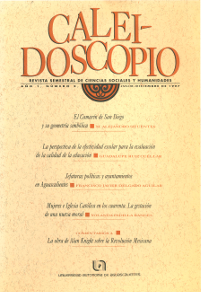Women and the Catholic Church in the 1940s. The emergence of a new morality
DOI:
https://doi.org/10.33064/2crscsh254Keywords:
woman, moral, Catholic Church, AguascalientesAbstract
The decade of the 40's was characterized, among other things, by the air of formalism in social and personal relationships. Shame was widespread, but in the case of women, it became a virtue. It seemed that men gave women a passive role in society and in everyday life. In this sense, women not only had to hide, but to offer some "smiling impassibility" to the outside world. Before the erotic dalliance he had to be "decent"; in the face of adversity, must be "suffered." However, women did not play the passive role they hoped to carry out. Women played an active role in the transformations of family life, for example, the displacement of the father by the mother as the dominant figure in the family, the increase of freedom for the children, a constant improvement in the standard of living through shopping for fertilizer, greater opportunities for fun, broader social relationships, and a gradual modernization of many beliefs. During the 1940s, women played a leading role, particularly in the ecclesial sphere, in which they were mainly able to express themselves, thus contributing to the recovery of a Catholic Church which in previous years had experienced the anticlerical clashes of the postrevolutionary Mexican state.Downloads
Downloads
Published
How to Cite
Issue
Section
License
Licencia Creative Commons Atribución-NoComercial-CompartirIgual 4.0 Internacional
El lector es libre de compartir o adaptar el material en cualquier medio o formato bajo las condiciones siguientes: (a) debe reconocer adecuadamente la autoría, proporcionar un enlace a la licencia e indicar si se han realizado cambios; (b) no puede utilizar el material para una finalidad comercial y (c) si remezcla, transforma o crea a partir del material, deberá difundir sus contribuciones bajo la misma licencia que el original.
Resumen de la licencia
https://creativecommons.org/licenses/by-nc-sa/4.0/deed.es_ES
Texto completo de la licencia
https://creativecommons.org/licenses/by-nc-sa/4.0/legalcode
Cada autor es responsable del contenido de su artículo. En el caso de un texto colectivo, el primer autor asume la responsabilidad intelectual de los resultados del proceso editorial; los autores son responsables de obtener la licencia de autor para reproducir materiales gráficos o fotográficos que pertenecen a terceros.
Los autores asumen plena responsabilidad en el caso de falsificación de datos o falta de autenticidad en la investigación. Se comprometen, también, a no reutilizar trabajos ya publicados, total o parcialmente, para presentarlos en otra publicación.
Estas condiciones aplican tanto a la versión impresa como a la versión electrónica de la revista.


















